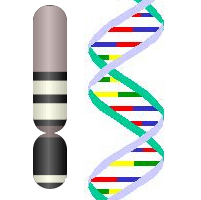
Will men be extinct in the future?
Table of Contents
Hold on to your seats, gentlemen — the male chromosome (Y chromosome) disappearing at a certain rate could absolutely be gone in the future. This presumption is based on genetic studies. It used to be genetically the same as the X chromosome. However, it has degenerated gradually, and now, it shriveled and became less relevant.
Male-determiner

Humans have two types of sex chromosomes: the X chromosome and the Y chromosome. Females have two X chromosomes whereas males have only one. Nonetheless, males have the Y chromosome that is passed on across generations from fathers to sons. In the XX/XY sex-determination system, it is the male-determining sex chromosome. Previously, the X chromosome was regarded as the sex-determiner. This conjecture, however, was eventually proven wrong when the SRY (sex-determining region Y) gene was identified on the male chromosome.1 This gene codes for the testis-determining factor, a protein that triggers testis development. Without this gene, testis fails to develop in males. There are few other genes present on the male chromosome. However, compared with the X chromosome, the Y chromosome is relatively gene-poor and the only highly notable gene on it is the SRY gene.
Y chromosome disappearing debate
Going back in time, about 166 million years ago, the first mammals had a Y chromosome (called a proto-Y chromosome) that was genetically similar to and of the same size as the X chromosome.2 However, the male chromosome diminished into the short chromosome that it is now. It degenerates as it loses genes through time. Unlike the other chromosomes, this chromosome does not undergo genetic recombination. Based on the current speed of degeneration, the Y chromosome would likely have 4.6 million years left, which relatively speaking is not that long, considering the 3.5 billion years that life has existed on Earth.2 Some mammals, such as certain rodent species, have already lost their entire Y chromosome. 3 Some experts (referred to as the “leavers”) infer that this event would also happen to humans in the future. This notion was opposed by others (the “remainers”) who believe that it would not disappear completely because it has evolved corrective mechanisms that slow down and deter gene loss. Gene amplification (the acquisition of multiple gene copies) and the presence of palindromes (a sequence that reads the same, whether backward or forward, e.g. AGTGA) help mitigate gene loss.3
Men without Y chromosome in the future
If the Y chromosome ultimately disappears in the future, what will happen to men? Will there be men in the future? Experts believe that men will get by when that time comes. Men would still be around just as women have been perfectly fine without it. As for the SRY gene, it could move to a different chromosome. Nonetheless, the chromosome that would take this gene would be at risk of going through the same fate as that of the Y chromosome.3 The absence of the SRY gene on the male chromosome is not new, however. In Swyer syndrome, the individual has a Y chromosome lacking the SRY gene and consequently fails to develop testis and other internal male organs. A person with this genetic condition is outwardly female but with a karyotype of a male (i.e. XY karyotype) .2
Further research on the degenerating male chromosome is essential to monitor the rate of gene loss on the Y chromosome. One possible implication of the possible complete disappearance of the Y chromosome is the impending necessity for more advanced reproductive modalities that can be applied artificially not just on humans but also on other mammals as reproduction by that time would ever hardly become natural.
— written by Maria Victoria Gonzaga
References
1 “Y chromosome”. (n.d.). biologyonline.com Dictionary. Retrieved from [https://www.biologyonline.com/dictionary/y-chromosome].
2 Griffin, D. & Ellis, P. (2018). The Y chromosome is disappearing – so what will happen to men?
Retrieved from https://theconversation.com/the-y-chromosome-is-disappearing-so-what-will-happen-to-men-90125
3 Griffin, D.K. Is the Y chromosome disappearing?—Both sides of the argument. Chromosome Res (2012) 20: 35. https://doi.org/10.1007/s10577-011-9252-1

